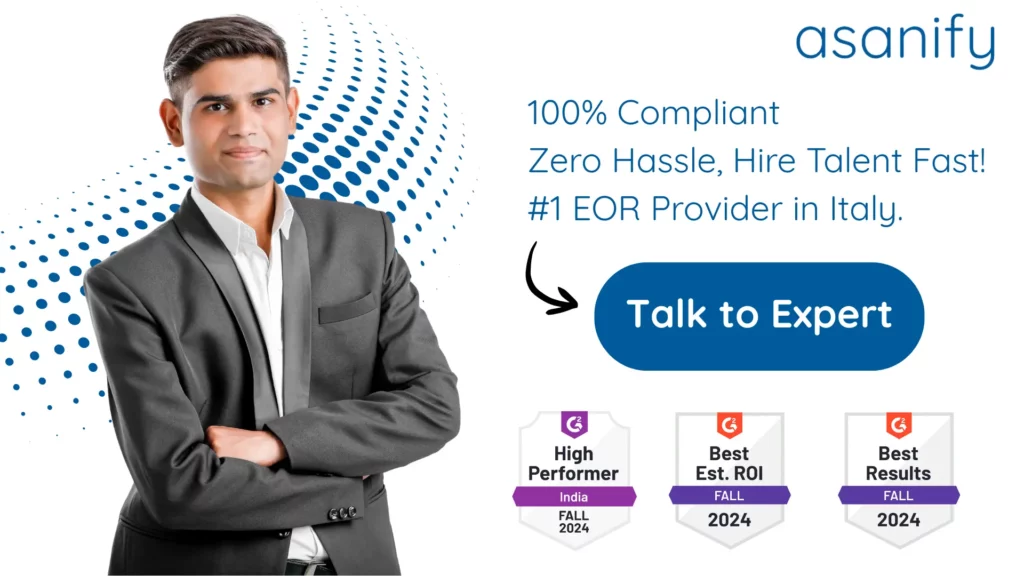Italy in 2025 continues to be a prime destination for global businesses looking to expand into Europe. Known for its diverse economy, strong manufacturing and design industries, and central location in the EU, Italy offers significant opportunities for foreign entrepreneurs. Cities like Milan, Rome, and Turin are leading centers for business and innovation, while government reforms and digital filing systems have made company registration more accessible than before.
This guide is tailored for international companies, entrepreneurs, and expansion teams planning to establish their presence in Italy. It covers market entry options, business structures, the step-by-step registration process, required documentation, post-incorporation compliance, and how an Employer of Record (EOR) can help companies hire quickly without full incorporation.
Table of Contents
- Exploring Your Market Entry Options in Italy
- Business Structures You Can Choose From
- Comparing Business Structure Options
- How to Choose the Right Business Model for Your Operations
- Step-by-Step Guide to Company Registration in Italy
- Key Documents Required to Register Your Italian Company
- Post-Incorporation Essentials You Shouldn’t Ignore in Italy
- Additional Business Licenses and Registrations You Might Need in Italy
- Timeframe to Set Up a Business in Italy
- What Does It Cost to Incorporate a Company in Italy?
- Obstacles Global Founders May Face While Setting Up in Italy
- Incorporating as a Foreign-Owned Company: A Special Path
- Employer of Record: A Simpler Way to Hire in Italy Without Incorporation
- Why Asanify is the Ideal Partner for Global Companies Entering Italy
- Summary & Final Takeaways
- FAQs
Exploring Your Market Entry Options in Italy
Before registering a company, it is crucial to choose how you want to operate in Italy. Global businesses typically follow one of two approaches:
Incorporating a Local Business Entity
Incorporating a company in Italy involves registering with the local Business Register (Registro delle Imprese), obtaining a tax number, and complying with Italian labor laws. This is the preferred route for businesses with long-term plans, local hiring needs, and the intention to raise capital or sign local contracts.
Hiring Through an Employer of Record (EOR)
If your goal is rapid market entry or small-scale operations, hiring through an EOR is a faster and more flexible approach. An EOR becomes the legal employer of your Italian workforce, managing employment contracts, payroll, social security contributions, and tax withholdings, while you maintain day-to-day control of your team. This method is ideal for testing the market or running short-term projects without the administrative burden of incorporation.
Business Structures You Can Choose From
Italy offers a range of business structures to accommodate different operational scales, investment needs, and liability preferences:
- Sole Proprietorship (Impresa Individuale) – Simple to form but with unlimited personal liability.
- General Partnership (SNC – Società in Nome Collettivo) – Two or more partners sharing management and joint liability.
- Limited Partnership (SAS – Società in Accomandita Semplice) – Combines active partners with unlimited liability and silent partners with limited liability.
- Limited Liability Company (SRL – Società a Responsabilità Limitata) – Popular for SMEs and foreign investors, with a minimum capital of €1 for simplified SRLs and €10,000 for standard SRLs.
- Public Limited Company (SpA – Società per Azioni) – Suited for large corporations or businesses intending to raise capital from multiple investors; requires €50,000 minimum capital.
- Branch Office (Sede Secondaria) – Operates as an extension of the foreign parent company; must register locally but is not a separate legal entity.
Comparing Business Structure Options
| Structure | Ownership | Liability | Taxation | Compliance | Best For |
| Sole Proprietorship | 1 owner | Unlimited | Personal income tax | Low | Freelancers and micro-businesses |
| SNC | 2+ partners | Unlimited | Personal income tax | Moderate | Small co-owned ventures |
| SAS | 2+ partners | Mixed | Personal/Corporate tax | Moderate | Partnerships with passive investors |
| SRL | 1+ shareholders | Limited | Corporate tax | Moderate | SMEs and foreign investors |
| SpA | 2+ shareholders | Limited | Corporate tax | High | Large corporations and fundraising |
| Branch Office | Parent company | Parent liable | Corporate tax on Italian revenue | Moderate | Market testing by foreign companies |

How to Choose the Right Business Model for Your Operations
Choosing the right structure in Italy depends on your goals, risk level, and growth plans.
- Business Size and Stage
Solo entrepreneurs can start with a Sole Proprietorship or SNC, while growing SMEs often choose an SRL. Large or expansion-focused businesses prefer an SpA. - Nature of Operations
Consulting or professional services may suit SNC or SAS. Product or tech ventures needing equity funding should opt for SRL or SpA. - Liability Appetite
SRL, SAS, and SpA provide limited liability, while Sole Proprietorships and SNCs carry personal risk. - Fundraising and Growth
SpA supports public fundraising, SRL is ideal for private investment, and partnerships have limited options. - Long-Term Plans
Choose SRL or SpA for scalable, investor-friendly operations; smaller partnerships work for stable, low-compliance businesses.
Suggested Read: The Complete 2025 Guide to Labour Laws in Italy
Step-by-Step Guide to Company Registration in Italy
- Choose the appropriate legal structure based on your goals and capital requirements.
- Select a unique company name and verify its availability with the Italian Business Register.
- Draft the Articles of Association (Atto Costitutivo e Statuto) and prepare incorporation documents.
- Deposit the required share capital into an Italian bank account, if applicable.
- Sign the incorporation deed in front of an Italian notary.
- Register the company with the Business Register (Registro delle Imprese) through the local Chamber of Commerce.
- Obtain a tax identification number (Codice Fiscale) and VAT number (Partita IVA) from the Italian Revenue Agency.
- Register for social security (INPS) and workplace insurance (INAIL) if you plan to hire employees.
Key Documents Required to Register Your Italian Company
- Passports or national IDs of all shareholders and directors
- Proof of residential address for shareholders and directors
- Articles of Association and Incorporation Deed (notarized)
- Bank statement confirming share capital deposit
- Proof of registered office address (lease or ownership)
- UBO declaration for compliance with EU anti-money laundering rules
Post-Incorporation Essentials You Shouldn’t Ignore in Italy
After your company is registered, several post-incorporation steps are mandatory:
- Activate VAT and tax registrations with the Italian Revenue Agency
- Register for social security and workplace insurance for employee compliance
- Set up payroll for salaries, tax withholdings, and social contributions
- Submit the UBO declaration to the Business Register
- Maintain accounting books and submit annual financial statements in compliance with Italian law
Additional Business Licenses and Registrations You Might Need in Italy
Certain businesses require additional registrations or permits depending on the activity:
- Municipal trade licenses for retail or physical establishments
- EORI registration for import/export activities within the EU
- Sector-specific permits for finance, education, healthcare, or food-related industries
- Environmental or safety permits for manufacturing or logistics operations
Timeframe to Set Up a Business in Italy
If documents are complete and notarized, incorporation in Italy can be completed in two to three weeks.
| Step | Estimated Duration |
| Draft and notarize Articles of Association | 2–4 business days |
| Deposit share capital and obtain confirmation | 2–5 business days |
| Register with the Business Register | 3–7 business days |
| Obtain tax number and VAT registration | 3–7 business days |
| Total Time to Register | 10–20 business days |
Delays may occur if foreign documents require translation, apostille, or additional sector approvals.

What Does It Cost to Incorporate a Company in Italy?
The cost of incorporation varies depending on the structure and professional support engaged:
- Government registration fees: €150–€400
- Notary fees: €600–€1,500 depending on capital and complexity
- Share capital deposit: €1 for simplified SRL, €10,000 for standard SRL, €50,000 for SpA
- Professional service fees: €500–€1,500 for lawyers, accountants, or consultants
- Optional sector-specific permits: €200–€1,000
On average, total costs range from €1,500 to €3,500.
Obstacles Global Founders May Face While Setting Up in Italy
Foreign entrepreneurs can encounter challenges such as:
- Document translation and notarization into Italian for all foreign-issued documents
- Understanding local labor, tax, and accounting compliance
- Banking procedures that often require in-person verification for share capital deposits
- Delays in regulatory approvals for specific industries
- Managing compliance remotely without a local representative
Incorporating as a Foreign-Owned Company: A Special Path
Foreign companies can establish their presence in Italy through:
- Wholly-Owned Subsidiary (SRL or SpA) – Offers complete control and limited liability
- Branch Office – Allows local operations but remains legally tied to the parent company
- Representative Office – For market research and non-commercial activities
Foreign investment in Italy is generally permitted, but strategic sectors like defense, telecom, energy, and financial services may require government approval under Italian FDI regulations.

Employer of Record: A Simpler Way to Hire in Italy Without Incorporation
Entering the Italian market does not always require setting up a local company. An Employer of Record (EOR) provides a fast and compliant way to hire employees in Italy without going through the lengthy incorporation process. It allows international businesses to focus on operations while the EOR manages local employment, payroll, and statutory compliance.
- EOR enables foreign companies to hire Italian employees without establishing an SRL or SpA.
- The EOR serves as the legal employer, managing contracts, payroll processing, taxes, and social security contributions.
- Your company retains day-to-day control over roles, responsibilities, and performance.
- Ideal for market testing, pilot projects, or creating small local teams quickly.
- EOR ensures compliance with Italian labor laws, reducing risks of penalties or misclassification.
- Handles statutory benefits including paid leave, pensions, and insurance obligations.
- Saves time and costs while enabling flexible and fully compliant market entry into Italy.
- Suggested Read: Employer of Record Italy: Complete 2025 Guide
Suggested Read: A Detailed Guide on Employer of Record Italy 2025
Why Asanify is the Ideal Partner for Global Companies Entering Italy
Expanding into Italy involves navigating local legal, tax, and HR compliance, which can be challenging for foreign businesses. Asanify simplifies this journey by offering both full company incorporation and Employer of Record (EOR) solutions, ensuring fast, compliant, and stress-free market entry.
- Asanify provides complete support for incorporation and EOR-based hiring in Italy.
- We manage company registration, tax setup, payroll, and compliance so you can focus on growth.
- Our EOR solution lets you hire Italian employees in just a few days without forming a legal entity.
- We ensure compliance with Italian labor laws, payroll taxes, social contributions, and employee benefits.
- Trusted by startups, SMEs, and multinational enterprises, Asanify offers local expertise, transparent pricing, and a seamless expansion experience.
Summary & Final Takeaways
Expanding into Italy provides access to a major EU market with high growth potential. Companies generally choose between incorporating a local entity, such as an SRL or SpA, for long-term control, or hiring through an Employer of Record for faster market entry with less administrative burden.
If your focus is long-term operations and scaling in Europe, incorporation is the ideal choice. If you need speed and flexibility while staying compliant, an EOR allows you to hire quickly without establishing a company.
FAQs
Usually 10 to 20 business days with complete documents and notarization.
Yes, structures like SRL and SpA allow 100% foreign ownership.
Not always, but in-person visits may be needed for banking and notary processes.
Simplified SRL can start with €1, standard SRL requires €10,000, and SpA needs €50,000.
Yes, through an Employer of Record, which manages payroll, contracts, and compliance.
Corporate income tax, regional production tax (IRAP), and VAT, plus social security contributions for employees.
Most sectors are open, but defense, telecom, energy, and finance require prior approval.
Yes, you can incorporate an SRL or SpA later and transfer operations to it.
Non-compliance may result in fines, delayed operations, or director liability.
Not to be considered as tax, legal, financial or HR advice. Regulations change over time so please consult a lawyer, accountant or Labour Law expert for specific guidance.

